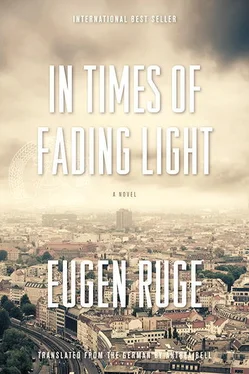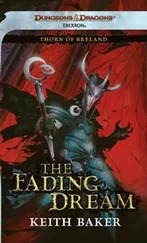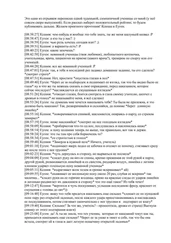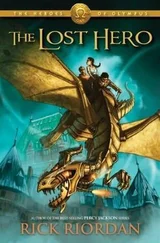“Thank you, we don’t need one now,” said Charlotte, and she was about to close the door again, but the taxi driver insisted on a call-out fare.
Call-out fare, thought Charlotte. What nerve!
But she had more important things to do than quarrel with the taxi driver. She handed him ten marks, and before he could get out the change she lost patience and closed the front door.
She hurried back into the salon and told Lisbeth, “Stop that!”
There was still nothing to be seen of Lisbeth but her bottom. Charlotte began to feel that she was conducting a conversation with Lisbeth’s rear end.
“Lotti, that won’t do,” said Lisbeth. “We can’t simply leave it all lying here!”
“We really do have more important matters at hand,” said Charlotte. “There are all the dishes still to be done in the kitchen. And Wilhelm’s evening tea to be made, or he’ll be complaining that it’s too hot again.”
“I’ll do the dishes afterward,” said Lisbeth, “and you can make his tea quickly before I finish in here.”
“Of course,” said Charlotte. “Do forgive me! I was forgetting that you’re the mistress in this house!”
She marched furiously into the kitchen, closed the door. Turned the key in the lock to be on the safe side.
Her breath was wheezing.
She ought never, thought Charlotte, to have let that woman address her on such familiar terms. No respect, nothing. Playing her up. Doing as she liked… once Wilhelm is out of the house, she thought, I’m firing Lisbeth.
She clutched the little bottle in her trouser pocket firmly in her fist and counted to ten. Then she filled the whistling kettle and put it on the gas stove.
Oddly enough, the door to the former servants’ corridor was open again. And someone had forgotten to switch off the light on the cellar stairs. A faint light showed the contours of the bricks in the doorway that Wilhelm had bricked up thirty-five years ago… she quickly switched off the light on the cellar stairs and closed the door to the former servants’ corridor.
Once Wilhelm is out of the house, she thought, I’m having that doorway opened up. Ridiculous, all of it! The very first thing he did, back then, was to remove the bell for the domestic staff as well, because it offended his proletarian honor! But she could shout herself hoarse if Lisbeth was wandering around the house somewhere. That didn’t offend his proletarian honor. After all, she was eighty-six now! Didn’t that count for anything? She had also been a Party member for sixty-two years! She had been director of the institute, with four years in domestic science college behind her! Did none of that count for anything? Did nothing count but Wilhelm’s proletarian honor?
She dropped on the stool, and leaned the back of her head against the wall. The whistling kettle began to murmur.
All of a sudden she felt very weak.
She closed her eyes. The water in the kettle began to whisper, to bubble softly… any moment there would be a faint hiss, she knew just how the sequence of sounds went. Hundreds, thousands of times she had sat beside the whistling kettle, listening to the whisper of the water, and her mother had hit her on the back of her head with the bread board if so much as the beginning of a whistle was heard: they had to save on gas so that her brother could study. That was why she had watched the whistling kettle, and the funny thing was that she was eighty-six now, her brother had died long ago, and she still sat here watching a whistling kettle… Why, she thought, while the hissing gradually rose to a regular, louder bubbling sound, why was she the one who always watched the whistling kettle… while other people could study… while other people got Orders of Merit of the Fatherland…
The bubbling stopped, passing into a low simmer, Charlotte stood up and turned off the gas just at the moment when the whistling kettle was about to whistle. Mechanically, she made Wilhelm’s evening tea, took the valerian drops out of the cupboard of cleaning materials under the sink. Put a dessertspoon of valerian into the tea. Put the valerian drops in her pants pocket… and stopped dead. Suddenly she had two little bottles in her hand: both the same size, you could hardly tell them apart…
An outrageous idea. Charlotte took the valerian drops out of her trouser pocket, put them back in the cupboard, and set to work again.
Lisbeth was still under the table.
“You’re still under the table,” Charlotte pointed out.
Lisbeth’s behind, at a snail’s pace, moved slowly out from that position. She was dragging a bucket full of broken china after her, as well as various containers in which she had collected remains of food that could still be eaten.
“Did you bring a few more plastic containers?” she asked. She was holding a little sausage in her hand.
“Never mind plastic containers,” said Charlotte. “That’s going in the garbage.”
“It’s not going on the garbage,” said Lisbeth, biting into the sausage.
Charlotte looked at Lisbeth’s munching face. Lisbeth’s lower jaw moved partly sideways, grinding like the jaw of a ruminant… for a while Charlotte watched the way Lisbeth’s lower jaw moved. Then she snatched the sausage from her hand and threw it on the heap of ruins representing all that was left of the cold buffet. She took two of the containers in which Lisbeth had been collecting remains of food and threw them after it.
“What are you doing?” cried Lisbeth, holding her hands protectively over the remaining containers.
Charlotte picked up the bucket of broken china and tipped it out as well.
“What are you doing?” This time it was Wilhelm’s voice.
“You keep out of this,” said Charlotte. “You’ve done enough damage today.”
“What do you mean, me?” said Wilhelm. “It was Zenk.”
“Oh, so it was Zenk, was it?” Charlotte laughed furiously. “So now it was Zenk! I told you to keep your hands off the extending table!”
“Oh, yes, so you did,” said Wilhelm. “Alexander was going to do it. So where is your precious Alexander?”
“Alexander is sick.”
“Stuff and nonsense,” said Wilhelm. “Politically unreliable.”
“Don’t talk such garbage,” said Charlotte.
“Politically unreliable,” repeated Wilhelm. “The whole family! Upstarts! Defeatists!”
“That’s enough,” said Charlotte. But there was no stopping Wilhelm now.
“There!” He laughed, pointing at the label stuck to her cardigan. “There we have it!” he crowed. “Look at you, going about advertising the traitor!” And suddenly he barked. Put his head back and barked at the ceiling. “Chev,” barked Wilhelm, “chev-chev,” and at the moment when Charlotte decided that she really did think he was deranged, he looked at her with a perfectly lucid gaze and said:
“They knew best why.”
“Knew best why what? ” asked Charlotte.
“Why they locked up people like that,” said Wilhelm, and after a pause he added, “people like your sons.”
Charlotte took a deep breath, and suddenly couldn’t let it out… looked at Wilhelm. His skull was shiny, his eyes flashed in his face, browned by the sunlamp. The mustache—had it always been so small?—was hopping about on Wilhelm’s upper lip, a tiny mustache not much bigger than an insect. It hopped, circled, hummed before her eyes… Then Wilhelm had disappeared. Only his words were left hanging in the air, or to be precise his last words.
Or to be even more precise, the last word.
“So what do I do now?” Lisbeth’s voice. “Do I clear all that stuff up again?”
“Now you go home,” said Charlotte.
Lisbeth didn’t seem to understand. Charlotte tried raising her voice: “I said, now you go home.”
Читать дальше












